Good old email marketing is one of today’s most effective promotion channels for small businesses, enabling a personalized approach to each client. It is incredibly effective in increasing lead generation and conversion, with email campaigns being the focus of many small companies.
Below is a comprehensive guide on organizing the best email marketing for a small business. Read on to learn more about effective email marketing for a small business.
Why Email Marketing Is Important
Whether you’re just starting your business or already scaling up, business email marketing is the top solution to enhance your online marketing campaigns. Above all, emails are incredibly popular!
The total number of active email users is projected to grow from 4.26 billion in 2022 to 4.73 billion by 2026, or almost 500 million new potential clients for crafty email marketers.
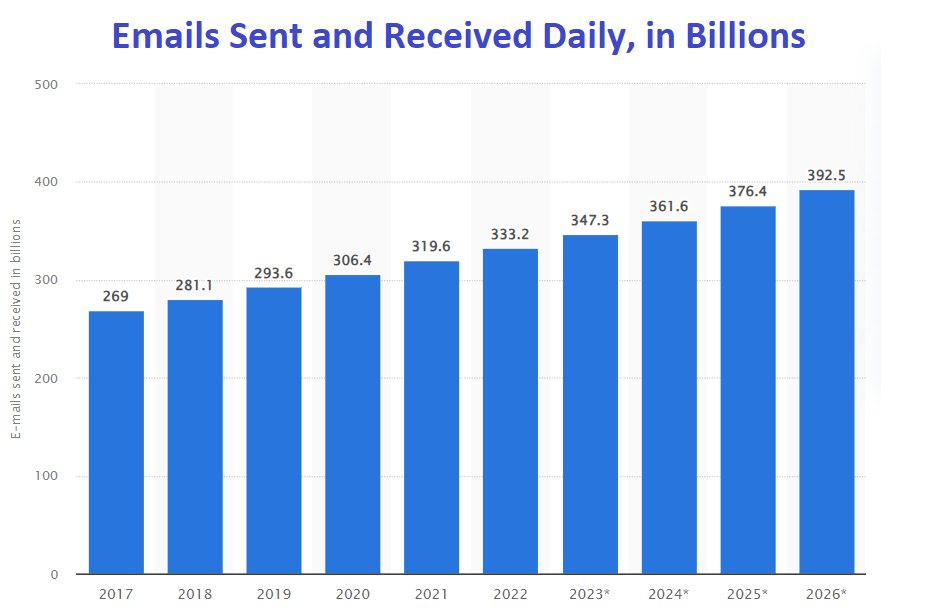
Source: Statista
The figures highlight a key point: email marketing for small businesses is by far the best opportunity to scale quickly and effectively as well as increase the conversion rate for the ever-growing customer base.
Why Use Email Marketing For Your Small Business? Source: HubSpot
Source: HubSpot
Here are some telltale statistics:
- According to HubSpot, about 32% of respondents consider email marketing for small businesses a key channel for brand promotion.
- According to Litmus, email marketing ROI reaches $36 for every $1 investment.
- According to Statista, the revenue from business email marketing will reach $17.9 billion by the end of 2027, with a CAGR of 13.3% from 2020 to 2027.
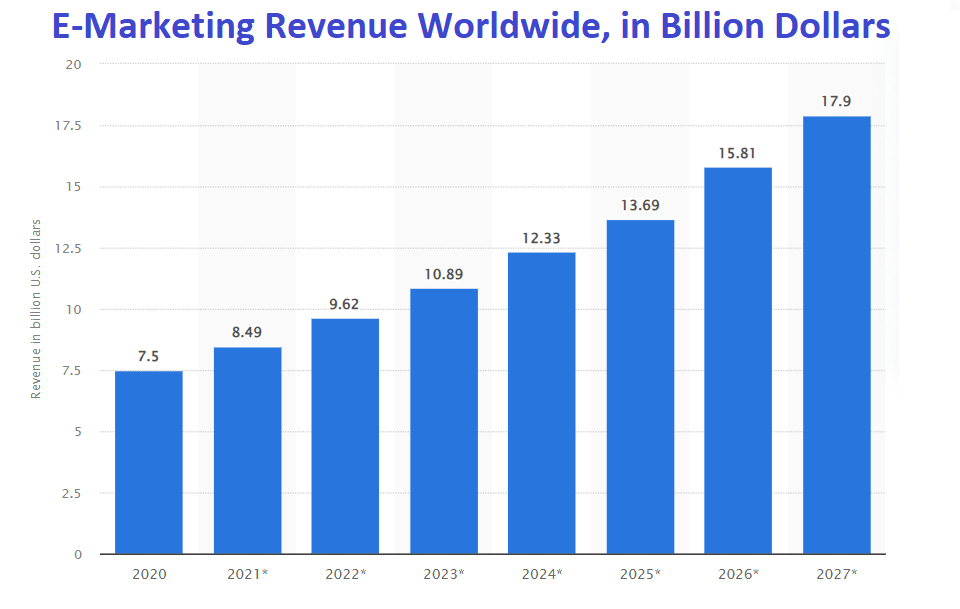
Source: Statista
Implementing email campaigns is an opportunity to scale quickly and almost limitlessly, especially if you can segment your target audience and personalize the message for every email recipient.
Here’s how segmentation can boost your targeting potential:
How To Start Email Marketing For Your Small Business
Here’s your detailed plan:
- Choose the right email marketing platform
- Build your mailing list
- Plan your campaign
- Create your email
- Launch the campaign and analyze the results
1. Choose The Right Email Marketing Platform For You
To launch your email marketing for small business owners, you’ll need the best email platform for small businesses in the first place. Not only does your strategy’s effectiveness depend on it, but also the ROI, the ability to collect and analyze results, build metrics, and visualize the campaign performance.
Here are the five user-friendly platforms for email marketing:
ConstantContact
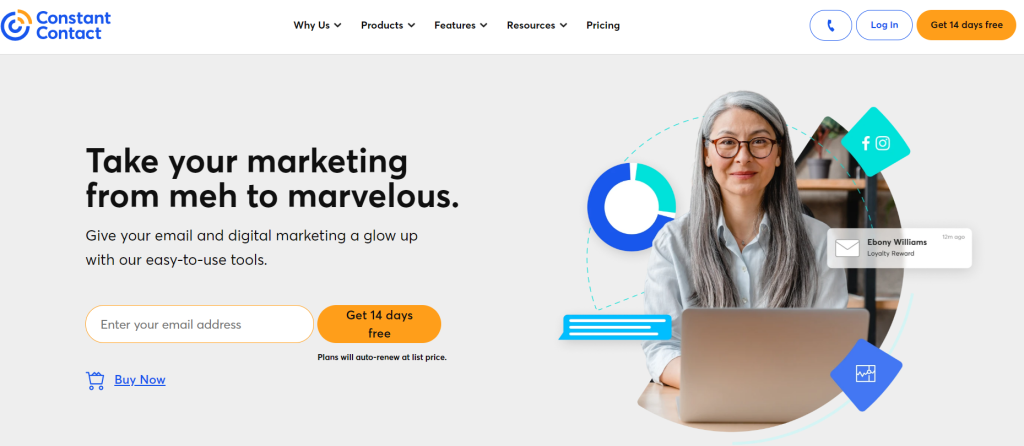
ConstantContact is one of the most comprehensive services for implementing email marketing ideas for a small business and bringing various advertising strategies to life.
HubSpot
 HubSpot needs no introduction. Without a doubt, it is the most famous of the best email platforms for a small business, combining a CRM platform, template generator functionality, powerful analytical tools, and a KPI measuring system.
HubSpot needs no introduction. Without a doubt, it is the most famous of the best email platforms for a small business, combining a CRM platform, template generator functionality, powerful analytical tools, and a KPI measuring system.
MailChimp
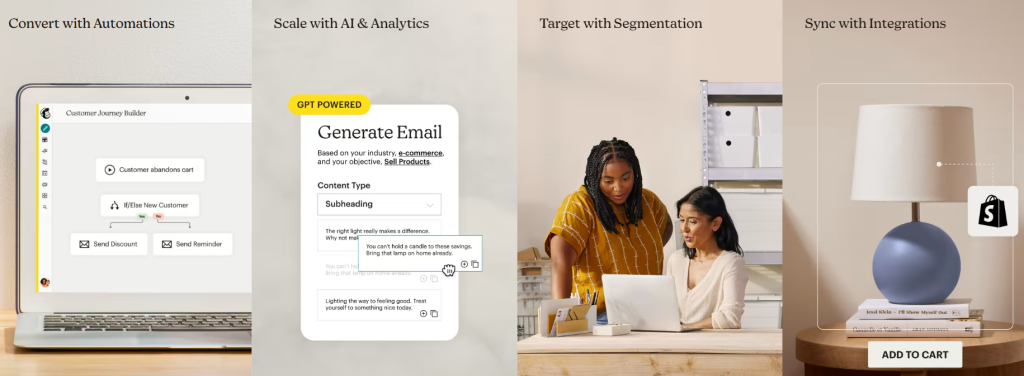 MailChimp is one of the best email platforms for business combining classic and innovative marketing software, providing access to advanced AI, and effectively implementing marketing automation algorithms.
MailChimp is one of the best email platforms for business combining classic and innovative marketing software, providing access to advanced AI, and effectively implementing marketing automation algorithms.
AWeber
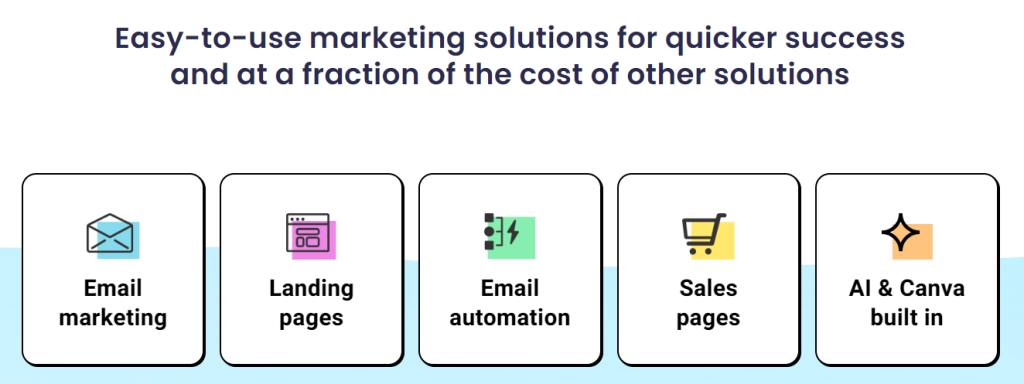 AWeber is a powerful email marketing software for small businesses designed for professional email marketing. The platform offers a wide range of tools for working with emails of all types and formats, and can personalize content for various recipient groups.
AWeber is a powerful email marketing software for small businesses designed for professional email marketing. The platform offers a wide range of tools for working with emails of all types and formats, and can personalize content for various recipient groups.
Brevo
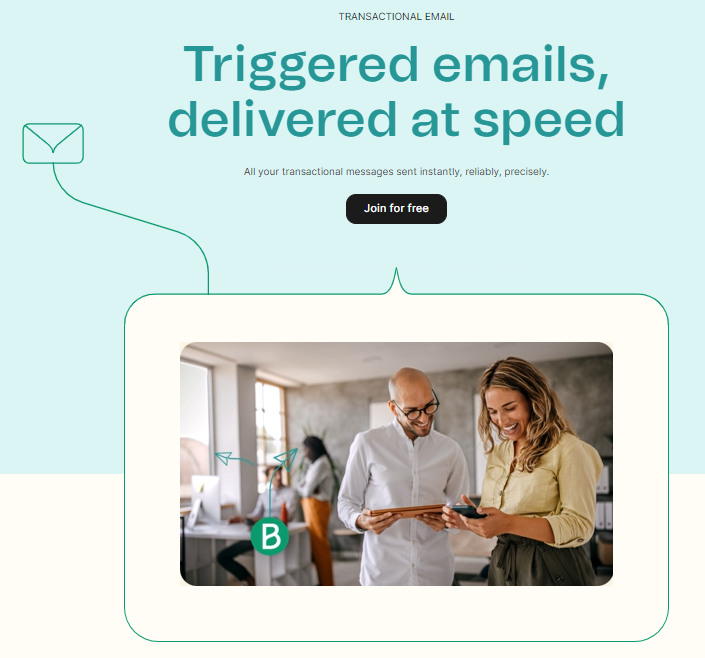 Brevo is one of the most complete and comprehensive email-sending platforms that allows you to customize email parameters. You can create and personalize an email campaign plan with the best email-sending service.
Brevo is one of the most complete and comprehensive email-sending platforms that allows you to customize email parameters. You can create and personalize an email campaign plan with the best email-sending service.
2. Build Your Mailing List
The main challenge for almost all beginners looking to implement email marketing for a small business is a lack of understanding of the campaign’s scale. Typically, they want to reach the entire audience and miss the scaling stage. As a result, they receive a low ROI (or even negative), weak KPIs, and no conversions.
The reason is quite simple – poor segmentation and targeting. Therefore, targeting your base of loyal customers should be the first step so you can shape a quality email system for small businesses.
3. Plan Your Campaign
Once you’ve completed segmentation and identified the optimal target audience, make sure to take a moment to think about these important aspects of your future campaign:
- Email sending schedule
- User engagement
- Personalization
- Automation through a platform for email marketing
- Scaling
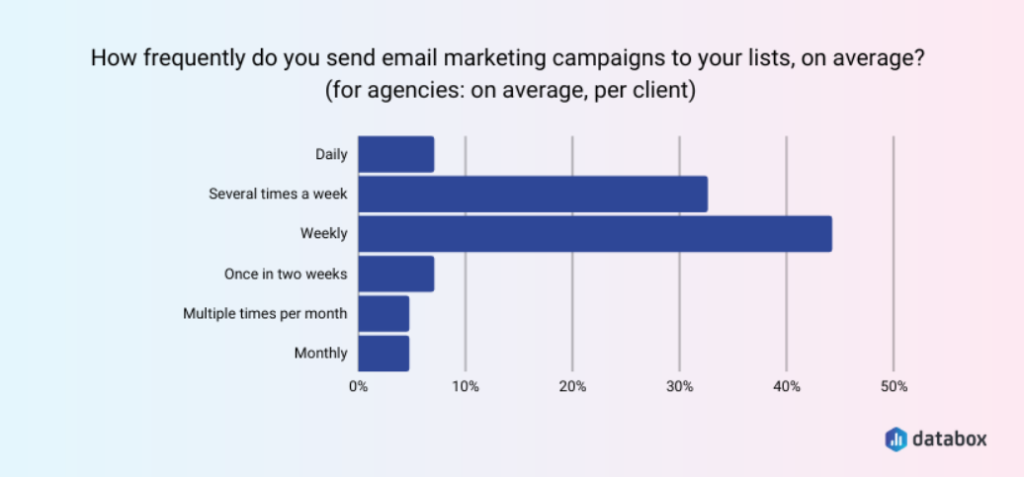
Source: DataBox
According to DataBox, more than 40% of marketers send emails only once a week, with around 30% of respondents sending several messages during the same period. Conversion-wise, those come on top who adhere to the optimal outreach frequency based on the user response.
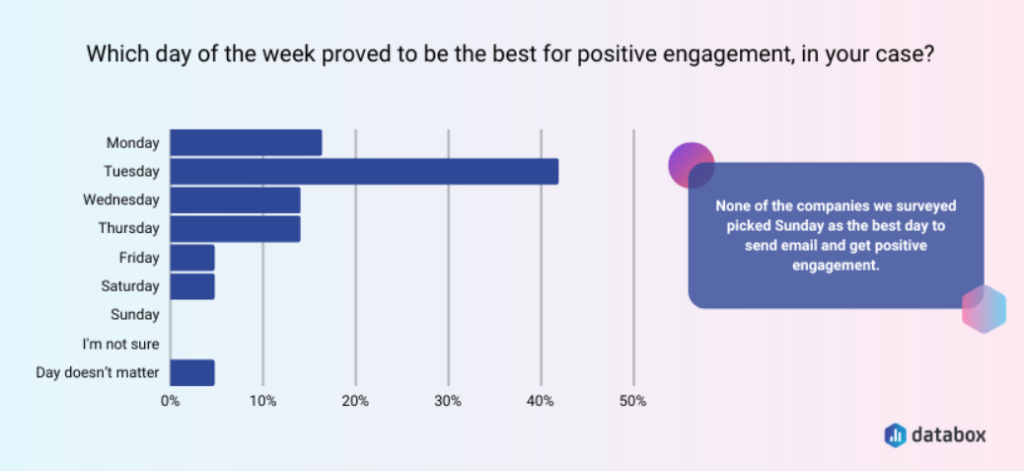
Source: DataBox
It turns out that in 40% of cases, emails received on Tuesday have the highest open and click rates. But then again, considering that the data provided here is generalized, you need to factor in the peculiarities of your particular business case when developing your outreach schedule.
Using Multiple Data Sources to Improve Campaign Messaging
4. Create Your Emails
The next step is creating the actual emails, or more precisely, their templates, content, design, and more.
Here, you’ll face several challenges:
- Personalization, as you can’t be sure that one template or design will appeal to the entire target audience
- Unique value proposition, which should stimulate a specific action
- Tone of voice, which should appeal to a specific recipient
- Creativity, which should set your email apart in the clogged inbox
There are no perfect algorithms for designing email layouts and content, but you can conduct A/B testing to determine which content works better and which you should abandon.
When working with an email marketing service company, you can purchase ready-made templates and tailor them to your subscribers’ needs and wants.
5. Launch The Campaign and Analyze The Results
Use specialized email marketing software for a small business to evaluate your campaigns and improve on the fly and strategically.
Below are the three top-tier email marketing software suites to use:
MailerLite
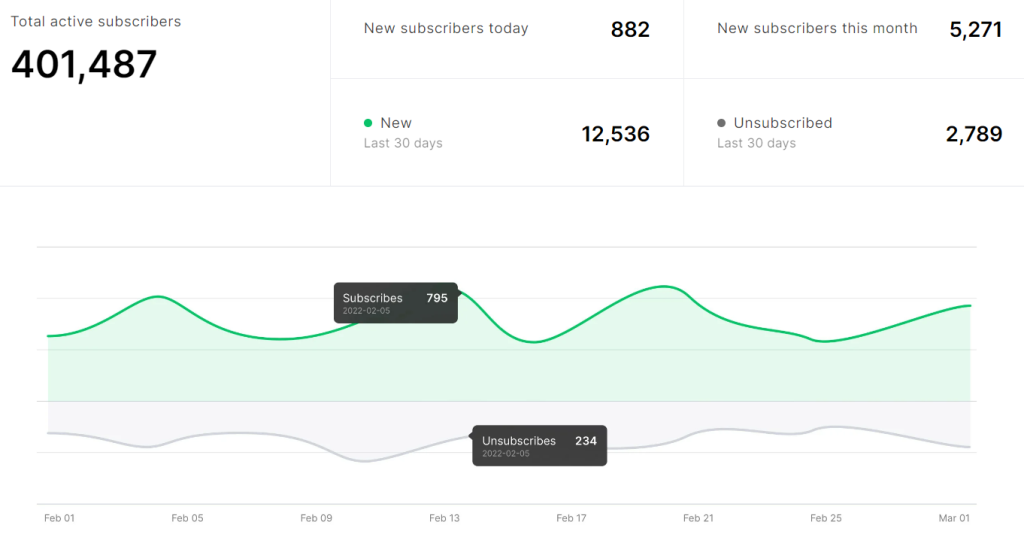 MailerLite is a comprehensive tool for analyzing and evaluating the effectiveness of email marketing for IT companies, providing free a trial period.
MailerLite is a comprehensive tool for analyzing and evaluating the effectiveness of email marketing for IT companies, providing free a trial period.
Moosend
 Moosend is one of the best email marketing providers for evaluating advertising creatives and email campaigns. The platform runs a user-friendly interface and gives AI-driven performance improvement suggestions.
Moosend is one of the best email marketing providers for evaluating advertising creatives and email campaigns. The platform runs a user-friendly interface and gives AI-driven performance improvement suggestions.
Campaigner
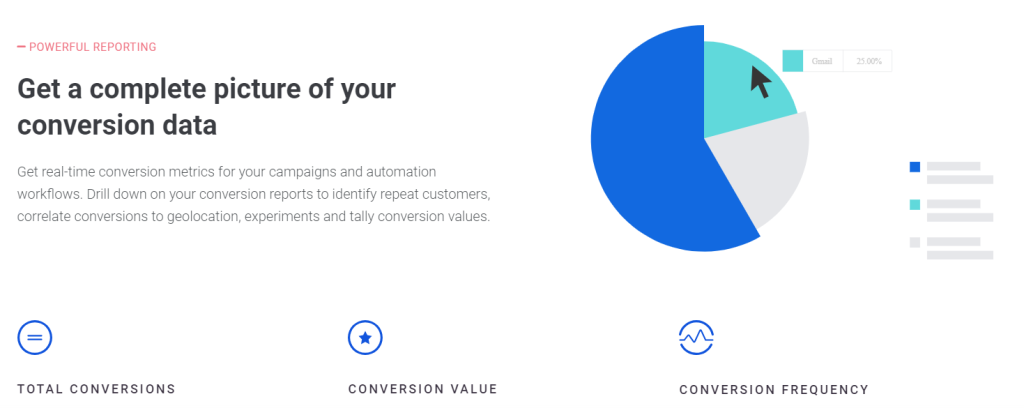
Campaigner is yet another representative of email marketing software for the small business industry, offering a comprehensive set of tools for analyzing the metrics of advertising campaigns.
Even if you can’t immediately choose the best email marketing service for a small business at first glance, don’t worry. All the mentioned platforms excel at their primary purpose. The question lies in the availability of a trial period and pricing.
Top 10 Benefits of Small Business Email Marketing
The primary goal of advertising traditionally lies in promoting the company, positioning it in the network, and building a reputation while providing value for the target audience. It’s precisely email service for small businesses that can drive the mentioned, and quite effectively if you’ve chosen the right strategy.
According to ConstantContact, the average click rate of opened email is only 1.33%, compared to the open rate of 34.46%. Not all emails work, but you can grow the conversion rates by designing, personalizing, and timing your emails appropriately.
Let’s take a closer look at the other benefits of effective email services for small businesses and find out how you can increase your email conversion rate.
1. Create Personalized Content
Without a doubt, customers you know well are more likely to cooperate and convert. Through email marketing tools for small businesses, you can collect information about your target audience and personalize emails for almost every recipient.

Source: ActiveCampaign
You can perform segmentation and automate content creation in email templates with a specialized tool, such as ActiveCampaign. This way, your audience will receive highly personalized messages covering each user’s interests, increasing email conversion.
2. Build Credibility
Through segmentation, personalization, and email service providers for small businesses, you can build trust with your target audience while tipping the sales scales in your favor.
Here’s how you can build credibility with your subscribers:
- Conduct segment analysis to identify loyal subscribers.
- Сreate templates with fields like “Name,” “Interests,” etc., and automate their filling from a hypothetical Data Lake using AI and NLP.
- Develop a mailing schedule.
- Launch the campaigns and analyze the KPI metrics.
- Process the results and correct errors.
With this approach, subscribers will likely notice your progress and overall expertise.
3. Increase Brand Recognition
Slowly but steadily, your brand becomes visible and perceived as reliable and popular. Conversion rates of your email campaigns will increase, and the number of bounces and blocked emails will decrease. Ultimately, this will drive your sales, especially during special and seasonal events.
4. Improve Sales
If your clients perceive themselves as part of your brand, see personalized content, and trust you, they will gladly cooperate, growing your subscriber and customer base. If you have built genuinely friendly relations with your target audience, it will be easier to draw new subscribers through tested strategies.
The growing email list will grant you more cross-selling opportunities, and you will be able to experiment with less risk.
5. Build Stronger Customer Relationships
To strengthen your relationships with subscribers and customers, engage them smartly during holidays and congratulate them on personal milestones and achievements.
The importance of the brand-customer dialogue has been proven multiple times by marketing, technology, and e-commerce giants, such as Apple or Microsoft. Each of these companies has a huge army of fans who will not switch sides under any circumstances.
6. Optimize Your Time and Budget
How many messages can you send in a minute, an hour, a day, or even a week manually? Not too many. The bigger your email list, the more you need email marketing automation software.
Modern tools can optimize almost all routine tasks associated with creating and customizing emails while leaving you in the driver’s seat of the process. As a result, you will spend much less time building email lists or creating and sending messages.
7. Increase Traffic to Your Website
Active links, like Call-to-Action (CTA) anchors, clickable content, or simply an address in the footer or header, generate unique traffic for your digital resource.
Pay attention to the email management templates for small businesses from the RGM resource, where each layout contains:
- Links to services or products
- Links to the main page of the website
- An active “Unsubscribe from…” link
8. Establish Authority
To show your audience you are an expert in the field, integrate links to thematic content, research, blogs, and news alongside creating compelling, in-depth, and versatile content. Provide advice and describe how to use your product or service effectively.
Stay on the same wavelength as your audience and offer them truly valuable materials. The results will surprise you as the attitude towards your brand gradually transforms from “Why do I need these emails?” to “I wonder what Company X thinks about Y.”
9. Build Excitement
Emotions are a lever of influence on an individual’s consciousness and a way to achieve broader goals. Use wordplay, intriguing headlines, suggestive designs, etc., in your email campaigns.
Doing so will create an appropriate atmosphere in your emails that will encourage recipients to learn more about what is hidden in the context of the message. Where to direct this interest next is up to you, but it’s worth stimulating your audience to take specific actions, such as subscribing to updates, purchasing a product, or communicating with a manager.
10. Email is an Asset You Own
Email marketing is an engine that should always run at a certain pace. Maintain your activity, taking into account the effectiveness of the current campaign. Only in this case can your email marketing yield desired results, such as increased conversion rates, lead generation, and more.
Last but not least, don’t worry if you face setbacks at the beginning. Just learn from the experience and confidently move forward!
Email Marketing Extravaganza at MailCon Show in New York
MailCon is back with a one-day email performance and deliverability conference on July 28th in New York City.
Every attendee will get:
- Productive email marketing sessions reinforced with panels and workshops addressing the most pressing topics for mailers
- Speaking and exhibition opportunities
- Connecting with renowned email marketing professionals and experts
And here’s why MailCon is the coolest email marketing event you can attend:
Here are some of the topics you’ll get covered on July 28th:
- Brand Safety & Better Subscriptions: What You Need to Know, by Ebenezer Anjorin, Lead Product Manager at Google Workspace
- Email Deliverability Starts Where Best Practices Fall Short, by Adrian W. from Email Angels
- The Importance of Securing Your Email Infrastructure and How to Do It, by Kevin A. McGrail, CEO of Peregrine Computer Consultants Corporation, and LB Blair, Head of Deliverability at Email Industries.
- Future-Proof Your Brand Like Beyoncé: Integrating Email & Social Media for Iconic Digital Presence, by Carlos Gil from GetResponse
- Insights from the expertise of renowned email deliverability consultants like Trey Bennett, Keith Kouzmanoff, Jakub Olexa, and more
- Expert panel on navigating the complexities of consumer privacy and compliance regulations, by Eric J. Troutman, Puja J. Amin, and Brittany Andres
- Marketing Crossfire session hosted by Channel Automation™ and featuring industry thought leaders
And so much more!
Get your tickets now before they sell out!
For those new, here’s everything you need to know about MailCon in just 90 seconds:
Discover MailCon in 90 Seconds
Frequently Asked Questions
Why is email marketing useful for small businesses?
Through email marketing, you can promote your company online and boost its reputation, among other things. Likewise, you can scale and expand your audience.
How does email marketing for small businesses boost sales?
Email marketing increases sales by appealing to your subscribers’ true needs and wants, whether they crave your unique expertise, entertainment, or else. Brands that actively use email marketing are generally more successful than ones promoting their products solely through their websites or social media.
Does it make sense to invest in email marketing for small businesses?
Yes, it makes sense to invest in email marketing for small businesses as long as you are ready to consistently update your strategy, test creatives, and perform other email marketing-associated routines.









